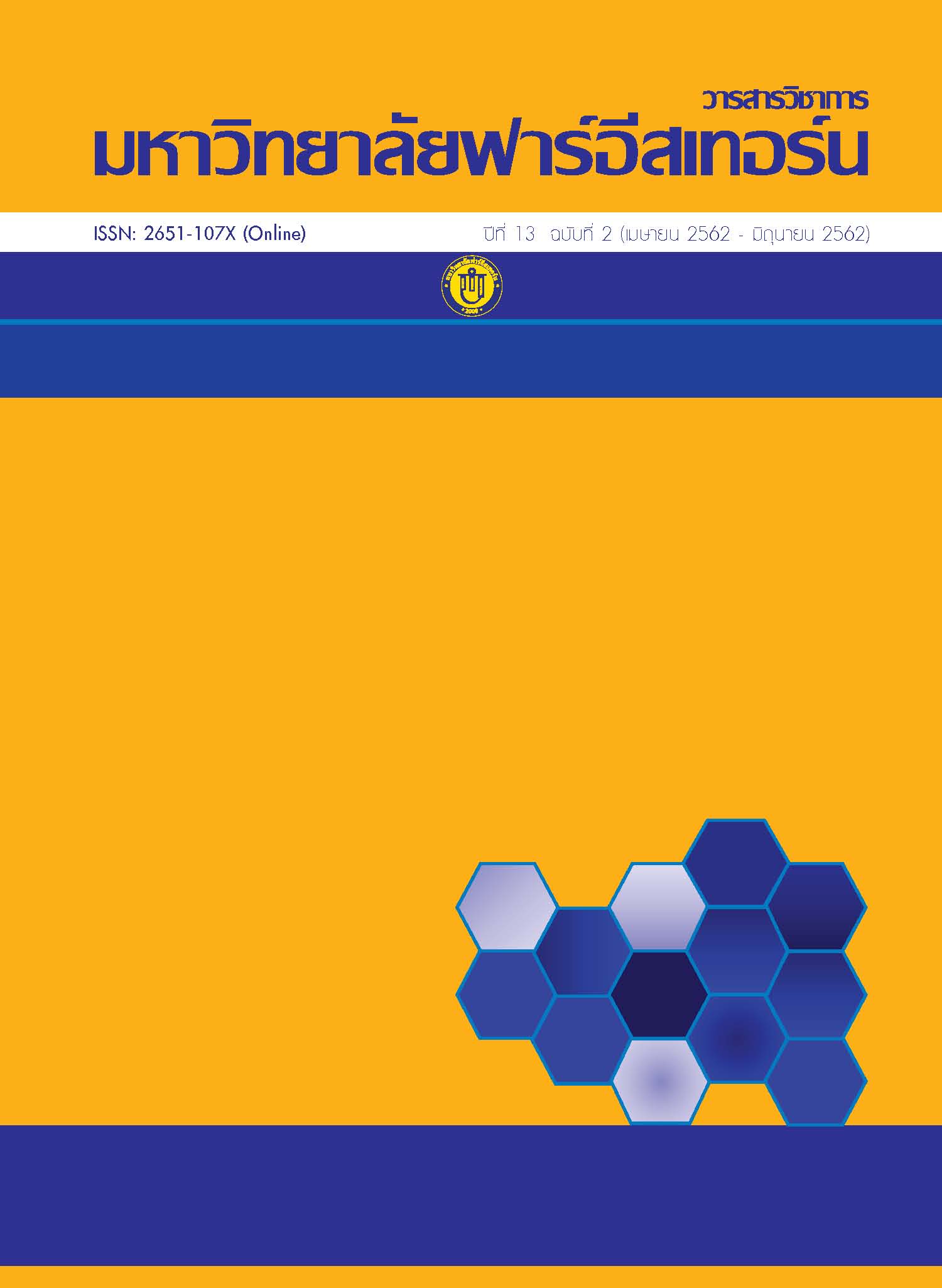Factors Affecting Economic Impact on Chinese Capitalists' Tourism Industrial Groups in Chiang Mai: Aspects of Public Sectors, Private Sectors, and Scholars
Main Article Content
Abstract
This research aims to study the factors affecting economic impact on Chinese capitalists' tourism industrial groups in Chiang Mai. Data were collected through in-depth interviews with 7 key informants from public sector, 5 representatives from private sector, additional in-depth interview 1 scholar to prevent bias, selected through purposive sampling. The data were analyzed by content analysis method. The research found that the public and private sectors and scholar agree that internal industrial demand concept which are tourism resource factors and souvenirs factors affect firmly on economic. Whilst other internal factors which are safety, basic infrastructures, facilities, advertisement and publications, and images, all have shown significant economic impact, both positive and negative, on the tourism industry in Chiang Mai. Although external factors such as economic and political situations, tourism popularity, and transport Therefore, there should be policies to control and maintain the situation well in order to efficiently accommodate the tourism industry in the city of Chiang Mai.
Article Details
1. Any views and comments in the Journal of Social Innovation and Lifelong Learning are the authors’ views. The editorial staff have not to agree with those views and it is not considered as the editorial’s responsibility.
2. The responsibility of content and draft check of each article belongs to each author. In case, there is any lawsuit about copyright infringement. It is considered as the authors’ sole responsibility.
3. The article copyright belonging to the authors and The Far Eastern University are copyrighted legally. Republication must be received direct permission from the authors and The Far Eastern University in written form.
References
ก้องภพ ภู่สุวรรณ. (2557). ปรับเชิงรุก ปลุกเชิงรับ จับกระแสนักท่องเที่ยวจีน. กรุงเทพ: ฝ่ายวิจัยเศรษฐกิจธนาคารแห่งประเทศไทย. กระทรวงการท่องเที่ยวและกีฬา. แผนพัฒนาการท่องเที่ยวแห่งชาติ พ.ศ.2555-2559. กระทรวงการท่องเที่ยวและกีฬา. เมษายน 2554. หน้า 6.
กองเศรษฐกิจการท่องเที่ยวและกีฬา. (2559). รายงานภาวะเศรษฐกิจท่องเที่ยว. สืบค้นวันที่ 6 สิงหาคม 2559, จาก https://www.mots.go.th/ew_dl_link.php?nid=7789 การท่องเที่ยวแห่งประเทศไทย.
ฉลองศรี พิมลสมพงศ์. (2557). การวางแผนและการพัฒนาตลาดการท่องเที่ยว. กรุงเทพมหานคร : คณะมนุษยศาสตร์ มหาวิทยาลัยเกษตรศาสตร์.
นพพล อัคฮาค. (2559). กระบวนการขับเคลื่อนการจัดทำบริการสาธารณะระหว่างหน่วยงานภาครัฐกับคณะทำงานชุมชนบนพื้นฐานแนวคิดการบริการสาธารณะแนวใหม่. วารสารการบริหารท้องถิ่น.
ปิยะลักษณ์ พุทธวงศ์. (2555). อุปสงค์การท่องเที่ยวต่างประเทศของนักท่องเที่ยวชาวไทย. สำนักงานกองทุนสนับสนุนการวิจัย. กรุงเทพฯ
ปรีชา แดงโรจน์. (2544). อุตสาหกรรมการท่องเที่ยวสู่ศตวรรษที่21.กรุงเทพฯ: ไฟร์ แอนด์ โฟร์ พรินติ้ง.
วิภา อุดมฉันท์, ไสว วิศวสนันท์, ทวี ธีระวงศ์เสรี, จันทร์จุฑา สุขขี และชัชวนันท์ สันธิเดช. (2558). สภาพปัญหาของการท่องเที่ยวระหว่างไทยกับจีน. กรุงเทพฯ : ศูนย์จีนศึกษา สถาบันเอเชียศึกษา จุฬาลงกรณมหาวิทยาลัย. สืบค้นเมื่อ 9 กันยายน 2560, จาก https://www.thairath.co.th/content/509538.
สาโรจน์ ธรรมรักษ์. (2559). การขยายบทบาทของกลุ่มทุนจีนที่มีผลกระทบต่อเศรษฐกิจของไทย. กระทรวงการต่างประเทศ.
อัครพงศ์ อั้นทองและมิ่งสรรพ์ขาวสะอาด. (2552). การวิเคราะห์อุปสงค์การท่องเที่ยวไทยในระยะยาว. วารสารเศรษฐศาสตร์ มหาวิทยาลัยเกษตรศาสตร์, 29(2),1-34.
Chan Yuk Wah. (2009). Disorganized Tourism Space Chinese Tourists in an age of Asian tourism USA:Routledge.
Yen, I. & Kerstetter, D. (2009). Tourism impacts, attitudes and behavioural intentions. Tourism Analysis, 13(5), 545- 564

